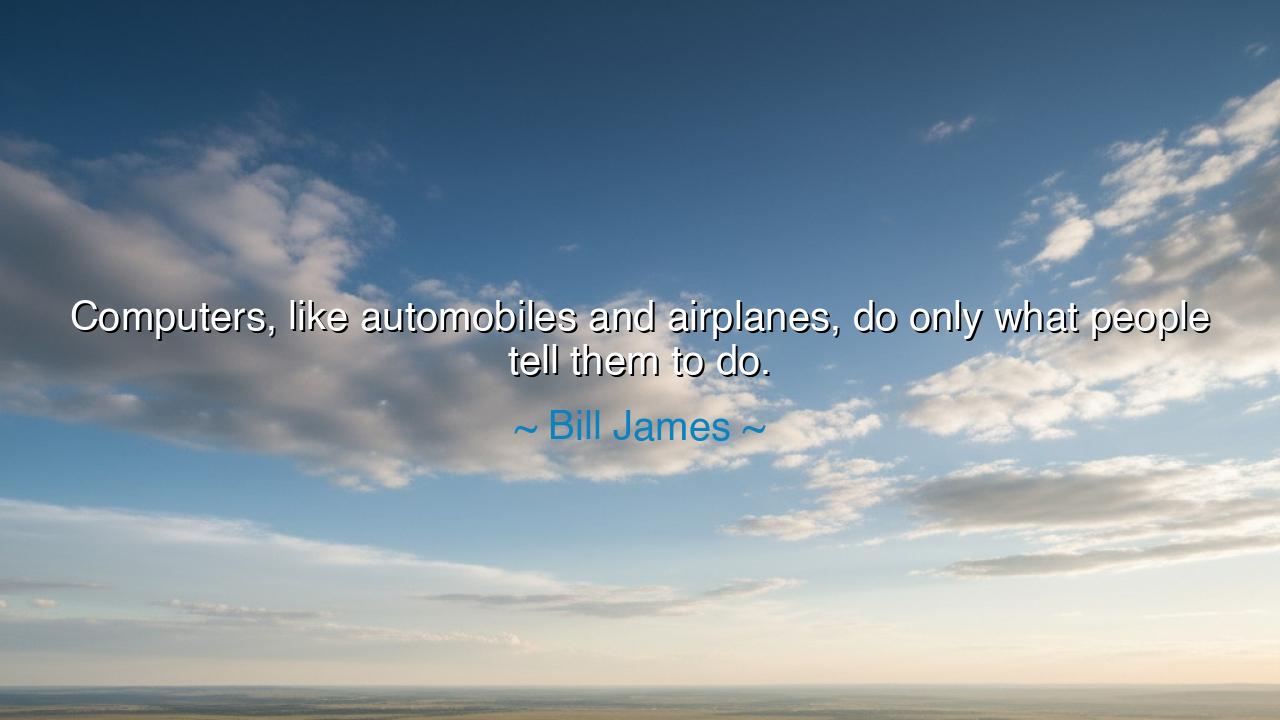
Computers, like automobiles and airplanes, do only what people






When Bill James declared, “Computers, like automobiles and airplanes, do only what people tell them to do,” he was not merely speaking of machines — he was reminding humanity of responsibility, of the eternal truth that every tool, however wondrous, remains an extension of human intent. His words cut through the illusions of the modern age, where men bow to the very inventions they themselves have created. James, known for transforming baseball through data and logic, understood that no algorithm, no machine, no system is greater than the mind that commands it. The computer, like the chariot or the spear of old, magnifies not wisdom or folly itself — but the hand and heart that guide it.
In ancient times, men forged weapons and later blamed the weapon for the blood it spilled. In our age, we build machines of silicon and code, and when they err, we call it “the machine’s fault.” But Bill James reminds us that no machine possesses will. Just as the automobile carries its driver where he chooses — to a hospital or to a battlefield — and the airplane can bring food or fire, so too the computer executes only the commands it is given. The moral compass lies not in metal or circuitry, but in the soul of the one who programs, instructs, and interprets it.
Consider the story of the Manhattan Project, where brilliant scientists gave birth to the atomic age. The bomb was not born evil; it was a machine obeying the logic of physics and the will of men. When it was unleashed upon Hiroshima, the world learned that invention without wisdom can wound creation itself. The same principle governs the digital realm: computers can cure diseases, predict storms, or create art — yet they can also spread lies, manipulate hearts, and erode truth. Thus, James’ words echo as an ancient warning cast in modern form: Technology magnifies character; it never replaces it.
In Bill James’s own life, the computer was not a god, but a mirror. He used it not to remove human judgment, but to sharpen it. Through analysis and data, he revealed truths hidden beneath tradition — showing that the game of baseball, like all human endeavors, can be understood through reason and reflection. Yet he never worshipped the numbers; he wielded them. The computer was his servant, not his master — a tool to illuminate, not dictate. His genius lay in knowing that wisdom begins where programming ends.
The deeper meaning of this quote lies in the moral humility of power. The ancients knew this truth well. When Daedalus built wings for his son Icarus, it was not the wings that failed — it was the pride that guided them too close to the sun. So it is with our machines: they will not betray us unless we first betray ourselves. Each new invention is both a gift and a test. The computer, like the airplane or the automobile, expands the horizon of human possibility — yet it also expands the consequences of human error.
Therefore, the true wisdom lies not in the marvel of invention, but in the discipline of intention. To tell a computer what to do is to imprint our moral will upon the world. Every line of code, every command, every algorithm reflects a fragment of the soul that created it. And so, as our tools grow stronger, the question is not “What can they do?” but “What should we make them do?” The power of the machine is the measure of the heart that wields it.
The lesson, then, is both humbling and empowering: never surrender your conscience to your creation. Whether you drive a car, fly a plane, or command a computer, remember that the steering wheel, the throttle, and the keyboard all await your direction. Their virtue or their ruin depends upon you. The age of technology is not the death of morality — it is its proving ground.
Practical actions for the mindful soul:
-
Before using a tool, ask yourself: What purpose does this serve, and whom does it serve?
-
Take ownership of your creations — in code, in craft, in life — for they carry your signature into the world.
-
Use machines to enhance human wisdom, not to escape it. Let data inform your judgment, not replace it.
-
Teach the young that no invention absolves them of moral choice; every command given is a seed of consequence.
For in the end, the machine obeys. It is man who chooses. And the destiny of both metal and mankind is shaped not by what we create, but by what we choose to command.






AAdministratorAdministrator
Welcome, honored guests. Please leave a comment, we will respond soon